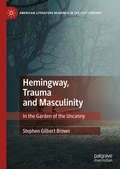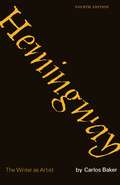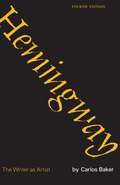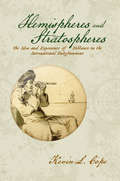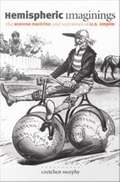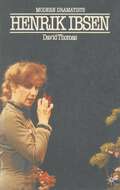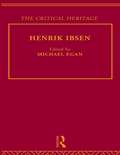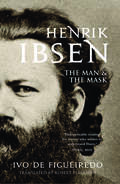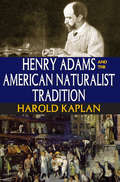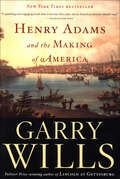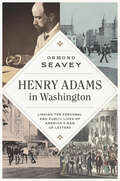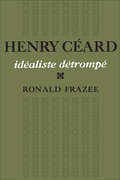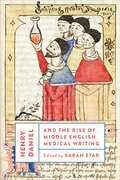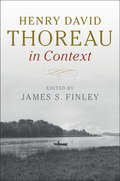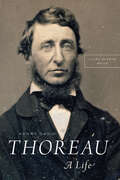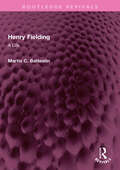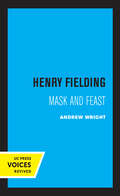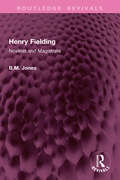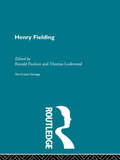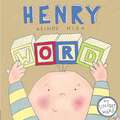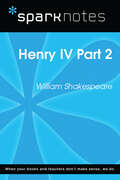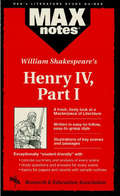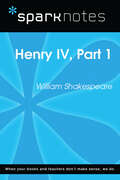- Table View
- List View
Hemingway, Style, and the Art of Emotion
by David WyattIn Hemingway, Style, and the Art of Emotion, David Wyatt shows that the work of Ernest Hemingway is marked more by vulnerability and deep feeling than by the stoic composure and ironic remove for which it is widely known. This major reassessment of the shape of Hemingway's career recovers the soul of the author's work, revealing him as a multifaceted writer rather than a cold, static icon. Wyatt claims that Hemingway's famous early style does not embrace emotional reticence but works instead to measure the cost of keeping thoughts and feelings under the surface. By the early 1930s Hemingway also turned away from the art of 'the omitted' and began to develop a vision and style more accommodating of the awkwardness and embarrassments of everyday life. Relying on a thorough knowledge of the vast archive Hemingway left behind at his death, this book shows Hemingway as a thoroughly complex and transmutable figure.
Hemingway, Trauma and Masculinity: In the Garden of the Uncanny (American Literature Readings in the 21st Century)
by Stephen Gilbert BrownHemingway, Trauma and Masculinity: In the Garden of the Uncanny is at once a model of literary interpretation and a psycho-critical reading of Hemingway’s life and art. This book is a provocative and theoretically sophisticated inquiry into the traumatic origins of the creative impulse and the dynamics of identity formation in Hemingway. Building on a body of wound-theory scholarship, the book seeks to reconcile the tensions between opposing Hemingway camps, while moving beyond these rivalries into a broader analysis of the relationship between trauma, identity formation and art in Hemingway.
Hemingway: The Writer As Artist
by Carlos BakerIn this fourth edition of the best-known critical study of Hemingway's work Carlos Baker has completely revised the two opening chapters, which deal with the young Hemingway's career in Paris, and has incorporated material uncovered after the publication of his book Ernest Hemingway: A Life Story. Professor Baker has also written two new chapters in which he discusses Hemingway's two posthumously published books, A Movable Feast and Islands in the Stream.CONTENTS: Introduction. I. The Slopes of Montparnasse. II. The Making of Americans. III. The Way It Was. IV. The Wastelanders. V. The Mountain and the Plain. VI. The First Forty-Five Stories. VII. The Spanish Earth. VIII. The Green Hills of Africa. IX. Depression at Key West. X. The Spanish Tragedy. XI. The River and the Trees. XII. The Ancient Mariner. XIII. The Death of the Lion. XIV. Looking Backward. XV. Islands in the Stream.
Hemingway: The Writer as Artist (3rd edition)
by Carlos BakerFor this new edition of the best-known critical study of Hemingway's work, Carlos Baker has completely revised the two opening chapters which deal with Hemingway's early career in Paris, and has incorporated some new material discovered since the publication of Ernest Hemingway: A Life Story. This edition also includes two new chapters on A Moveable Feast and Islands in the Stream.
Hemispheres and Stratospheres: The Idea and Experience of Distance in the International Enlightenment (Transits: Literature, Thought & Culture 1650-1850)
by Rachel Mann Phyllis Thompson Kevin L. Cope Roger D. Lund William Stargard Bärbel Czennia Brijraj Singh Chandrava ChakravartyRecognizing distance as a central concern of the Enlightenment, this volume offers eight essays on distance in art and literature; on cultural transmission and exchange over distance; and on distance as a topic in science, a theme in literature, and a central issue in modern research methods. Through studies of landscape gardens, architecture, imaginary voyages, transcontinental philosophical exchange, and cosmological poetry, Hemispheres and Stratospheres unfurls the early history of a distance culture that influences our own era of global information exchange, long-haul flights, colossal skyscrapers, and space tourism. Published by Bucknell University Press. Distributed worldwide by Rutgers University Press.
Hemispheric Imaginings: The Monroe Doctrine and Narratives of U.S. Empire
by Gretchen MurphyIn 1823, President James Monroe announced that the Western Hemisphere was closed to any future European colonization and that the United States would protect the Americas as a space destined for democracy. Over the next century, these ideas--which came to be known as the Monroe Doctrine--provided the framework through which Americans understood and articulated their military and diplomatic role in the world. Hemispheric Imaginings demonstrates that North Americans conceived and developed the Monroe Doctrine in relation to transatlantic literary narratives. Gretchen Murphy argues that fiction and journalism were crucial to popularizing and making sense of the Doctrine's contradictions, including the fact that it both drove and concealed U. S. imperialism. Presenting fiction and popular journalism as key arenas in which such inconsistencies were challenged or obscured, Murphy highlights the major role writers played in shaping conceptions of the U. S. empire. Murphy juxtaposes close readings of novels with analyses of nonfiction texts. From uncovering the literary inspirations for the Monroe Doctrine itself to tracing visions of hemispheric unity and transatlantic separation in novels by Lydia Maria Child, Nathaniel Hawthorne, Mara Amparo Ruiz de Burton, Lew Wallace, and Richard Harding Davis, she reveals the Doctrine's forgotten cultural history. In making a vital contribution to the effort to move American Studies beyond its limited focus on the United States, Murphy questions recent proposals to reframe the discipline in hemispheric terms. She warns that to do so risks replicating the Monroe Doctrine's proprietary claim to isolate the Americas from the rest of the world.
Henrik Ibsen
by Michael EganThis set comprises 40 volumes covering 19th and 20th century European and American authors. These volumes will be available as a complete set, mini boxed sets (by theme) or as individual volumes. This second set complements the first 68 volume set of Critical Heritage published by Routledge in October 1995.
Henrik Ibsen: The Man and the Mask
by Ivo De FigueiredoA magnificent new biography of Henrik Ibsen, among the greatest of modern playwrights Henrik Ibsen (1820–1908) is arguably the most important playwright of the nineteenth century. Globally he remains the most performed playwright after Shakespeare, and Hedda Gabler, A Doll’s House, Peer Gynt, and Ghosts are all masterpieces of psychological insight. This is the first full-scale biography to take a literary as well as historical approach to the works, life, and times of Ibsen. Ivo de Figueiredo shows how, as a man, Ibsen was drawn toward authoritarianism, was absolute in his judgments over others, and resisted the ideas of equality and human rights that formed the bases of the emerging democracies in Europe. And yet as an artist, he advanced debates about the modern individual’s freedom and responsibility—and cultivated his own image accordingly. Where other biographies try to show how the artist creates the art, this book reveals how, in Ibsen’s case, the art shaped the artist.
Henry Adams and the American Naturalist Tradition
by Harold KaplanThe naturalist tradition in American fiction was a product of the tremendous changes wrought in late nineteenth-century America by the development of science and technology and by the intellectual upheavals associated with the ideas of Darwin, Marx, Nietzsche, and Freud. This book is an account of naturalism, perhaps the strongest and most influential intellectual tradition or, as Harold Kaplan would argue, mythology to affect modern American literature and culture.Kaplan approaches the naturalist writers through a study of Henry Adams. He sees in Adams the paradigmatic intelligence of his time a prophetic mind, though not a seminal one and a man absorbed with the twin notions of power and order. Adams's major work illustrates the joining of a literary imagination and moral temperament with an almost obsessive response to the science, economic life, and politics of his world. Adams's work exemplifies what Kaplan calls the myth of metapolitics a view of human struggle and fate profoundly dominated by naturalist concepts of power.Kaplan then turns to the fascination that power in its various manifestations material, moral, social, political held for writers such as Dreiser, Norris, Crane, and others. Their dramatic plots, characters, and allegorical images are examined in detail. In wider reference, this book should concern those who are interested in problems of modern ethics and politics in the effort to harmonize concepts of value with images of power and natural order.
Henry Adams and the Making of America
by Garry WillsNew York Times Bestseller: From a Pulitzer Prize winner, a “sparking and engaging book that everyone who cares about America’s history should read” (The Washington Post).In this book, one of today’s greatest historians offers a surprising new view of the greatest historian of the nineteenth century: Henry Adams. Garry Wills, author of Lincoln at Gettysburg, showcases Adams’s little-known but seminal study of the early United States and elicits from it fresh insights on the paradoxes that roil America to this day. Adams drew on his own southern fixation, his extensive foreign travel, his political service in Lincoln’s White House, and much more to invent the study of history as we know it. His nine-volume chronicle of America from 1800 to 1816 established new standards for employing archival sources, firsthand reportage, eyewitness accounts, and other techniques that have become the essence of modern history.Adams’s innovations went beyond the technical; he posited an essentially ironic view of the legacy of Jefferson and Madison. As is well known, they strove to shield the young country from “foreign entanglements,” a standing army, a central bank, and a federal bureaucracy, among other hallmarks of “big government.” Yet by the end of their tenures they had permanently entrenched all of these things in American society. This is the “American paradox” that defines us today: the idealized desire for isolation and political simplicity battling against the inexorable growth and intermingling of political, economic, and military forces. As Wills compellingly shows, the ironies spawned two centuries ago still inhabit our foreign policy and the widening schisms over economic and social policy. Ambitious in scope, nuanced in detail and argument, Henry Adams and the Making of America throws brilliant light on how history is made—in both senses of the term.“Felicitous prose and compelling argument.” —Publishers Weekly (starred review)“Wills [is] incapable of writing a dull paragraph.” —Los Angeles Times
Henry Adams in Washington: Linking the Personal and Public Lives of America's Man of Letters
by Ormond SeaveyA descendent of two U.S. presidents and winner of the Pulitzer Prize, Henry Adams enjoyed a very particular place in American life, not least due to his ancestry. Yet despite his prolific writing in the years between 1877 and 1891, when he lived in Washington, D.C., Adams has somehow slipped into the gap between history and literature. In Henry Adams in Washington, Ormond Seavey integrates the diverse aspects of Adams’s writing, arguing for his placement among the major American writers of the nineteenth century.Examining Adams’s nine-volume History, which Seavey argues demands renewed literary attention, as well as his two novels, Democracy and Esther, and his biographies of Albert Gallatin and John Randolph of Roanoke, Seavey shows how Adams reveals his own character and personality in his writings, particularly his fondness for the personal rather than the public sphere. As a historian writing in Washington, D.C., Adams surely encountered the expectation that public life takes precedence over the personal; in the execution of both his historical writing and his novels, however, he dwells instead on the personal costs of public life and the diminishment of public figures who lack a fulfilling personal life. Revealing Adams to be a missing link between the essential American writers in the time of Emerson and the modernist writers of the early twentieth century, Seavey shows his novels to be considerations of contemporary political issues while also recognizing the novelistic dimensions in his history and biographies.
Henry Cérard: idéaliste détrompé
by Ronald FrazeeHere for the first time is an authoritative account of the life and literary activity of a long-neglected writer of the French naturalist school. Its appearance now is especially timely in view of the recent revival of interest in Zola, Maupassant and Huysmans, and the publication of the complete Goncourt Journals. Cérard's written works were virtually neglected by his contemporaries as well as by most historians of the naturalist movement. However, his novels, short stories, and plays had good critical receptions, and in providing this study of the author, as well as a comprehensive bibliography of all his works, Mr. Frazee is performing a valuable service for students of literature. As an artist Cérard was perhaps less powerful than Zola or Goncourt, but one appreciates, as Mr. Frazee has noted, "la prédominance de l'esprit d'analyse sur l'esprit d'imagination." An important contribution was his early experimental novel Une belle journée; this explored in depth a single day in a character's life, and was the first of a number of such novels, which culminated in Joyce's Ulysses. While attempting to give Cérard his due as an artist Mr. Frazee, in seeking to discover the relations between this paradoxical personality and his work, has not hesitated to point out Cérard's personal failings. Cérard was an intriguing blend of deceptive simplicity and surprising complexity, and he showed a pessimism and resignation, typical of the fin de siècle, which were evidence of the influence of Schopenhauer. Because secondary writers often give a better picture of their times than their better-known contemporaries, this biography, too, is able to shed new light on the last thirty years of the nineteenth century while providing an important guide for today's scholars and the future investigators of an important area of French literature.
Henry Daniel and the Rise of Middle English Medical Writing
by Sarah StarHenry Daniel, fourteenth-century medical writer, Dominican friar, and contemporary of Chaucer, is one of the most neglected figures to whom we can attribute a substantial body of extant works in Middle English. His Liber Uricrisiarum, the earliest known medical text in Middle English, synthesizes authoritative traditions into a new diagnostic encyclopedia characterized by its stylistic verve and intellectual scope. Drawing on expertise from a range of scholars, this volume examines Daniel’s capacious works and demonstrates their significance to many scholarly conversations, including the history of late medieval medicine. It explains the background for Daniel’s uroscopic and herbal work, describes all known versions of the Liber Uricrisiarum and traces revisions over time, analyses Daniel’s representations of his own medical practice, and demonstrates his influence on later medical and literary writers. Both a companion to the recently published reading edition of the Liber Uricrisiarum and a work of original scholarship in its own right, this collection promotes a wider understanding of Daniel’s texts and prompts new discoveries about their importance.
Henry David Thoreau in Context (Literature in Context)
by James S. FinleyWell known for his contrarianism and solitude, Henry David Thoreau was nonetheless deeply responsive to the world around him. His writings bear the traces of his wide-ranging reading, travels, political interests, and social influences. Henry David Thoreau in Context brings together leading scholars of Thoreau and nineteenth-century American literature and culture and presents original research, valuable synthesis of historical and scholarly sources, and innovative readings of Thoreau's texts. Across thirty-four chapters, this collection reveals a Thoreau deeply concerned with and shaped by a diverse range of environments, intellectual traditions, social issues, and modes of scientific practice. Essays also illuminate important posthumous contexts and consider the specific challenges of contextualizing Thoreau today. This collection provides a rich understanding of Thoreau and nineteenth-century American literature, political activism, and environmentalist thinking that will be a vital resource for students, teachers, scholars, and general readers.
Henry David Thoreau: A Life (Science And Literature Ser.)
by Laura Dassow Walls“Walden. Yesterday I came here to live.” That entry from the journal of Henry David Thoreau, and the intellectual journey it began, would by themselves be enough to place Thoreau in the American pantheon. His attempt to “live deliberately” in a small woods at the edge of his hometown of Concord has been a touchstone for individualists and seekers since the publication of Walden in 1854. But there was much more to Thoreau than his brief experiment in living at Walden Pond. A member of the vibrant intellectual circle centered on his neighbor Ralph Waldo Emerson, he was also an ardent naturalist, a manual laborer and inventor, a radical political activist, and more. Many books have taken up various aspects of Thoreau’s character and achievements, but, as Laura Dassow Walls writes, “Thoreau has never been captured between covers; he was too quixotic, mischievous, many-sided.” Two hundred years after his birth, and two generations after the last full-scale biography, Walls restores Henry David Thoreau to us in all his profound, inspiring complexity. Walls traces the full arc of Thoreau’s life, from his early days in the intellectual hothouse of Concord, when the American experiment still felt fresh and precarious, and “America was a family affair, earned by one generation and about to pass to the next.” By the time he died in 1862, at only forty-four years of age, Thoreau had witnessed the transformation of his world from a community of farmers and artisans into a bustling, interconnected commercial nation. What did that portend for the contemplative individual and abundant, wild nature that Thoreau celebrated? Drawing on Thoreau’s copious writings, published and unpublished, Walls presents a Thoreau vigorously alive in all his quirks and contradictions: the young man shattered by the sudden death of his brother; the ambitious Harvard College student; the ecstatic visionary who closed Walden with an account of the regenerative power of the Cosmos. We meet the man whose belief in human freedom and the value of labor made him an uncompromising abolitionist; the solitary walker who found society in nature, but also found his own nature in the society of which he was a deeply interwoven part. And, running through it all, Thoreau the passionate naturalist, who, long before the age of environmentalism, saw tragedy for future generations in the human heedlessness around him. “The Thoreau I sought was not in any book, so I wrote this one,” says Walls. The result is a Thoreau unlike any seen since he walked the streets of Concord, a Thoreau for our time and all time.
Henry Fielding: A Life (Routledge Revivals)
by Martin C BattestinFirst published in 1989, Henry Fielding is a biography presenting a fresh interpretation of Fielding’s life and thought. Using newly discovered information, including new facts, three hitherto unknown pictures of Fielding drawn from life, documents, manuscripts, and many crucially important and engrossing new letters, Martin C. Battestin – the foremost Fielding scholar – illuminates every aspect of Fielding’s life and work. Fielding and the life he led – in the West Country, at Eton, at the University of Leyden, and in the theatres and brothels, sponging houses and police courts of London – make for fascinating reading. This authoritative and timely biography will appeal to all those interested in the society and literature of eighteenth-century England.
Henry Fielding: Mask and Feast
by Andrew WrightThis title is part of UC Press's Voices Revived program, which commemorates University of California Press’s mission to seek out and cultivate the brightest minds and give them voice, reach, and impact. Drawing on a backlist dating to 1893, Voices Revived makes high-quality, peer-reviewed scholarship accessible once again using print-on-demand technology. This title was originally published in 1965.
Henry Fielding: Novelist and Magistrate (Routledge Revivals)
by B.M. JonesHenry Fielding (1933) examines Fielding’s prodigious activity as dramatist, journalist, novelist and magistrate. Though Fielding lived mainly by his pen, the profession he had chosen for himself, and the one in which he ardently desired to succeed, was that of the law, and this book takes the man as a whole in looking at his writings and his success at law.
Henry Fielding: The Critical Heritage (The\wesleyan Edition Of The Works Of Henry Fielding Ser.)
by Ronald Paulson and Thomas LockwoodThe Critical Heritage gathers together a large body of critical sources on major figures in literature. Each volume presents contemporary responses to a writer's work, enabling students and researchers to read the material themselves.
Henry Finds His Word
by Lindsay WardNew moms and their babies will love watching Henry say his first wordBaby Henry is under a lot of pressure to say his first word. His parents are all excited about what it will be, but Henry doesn’t see what the big deal is. He says things all the time like “bbbghsh” and “boop,” but no one seems to understand what he means. So, Henry decides that he better start searching for a word. Luckily, just when he needs it most, his first word comes looking for him.This picture book about learning to talk is the perfect gift for new parents and big brothers and sisters. Watching Henry hit this developmental milestone is a treat, and new moms will melt when they find out what Henry's first word is.
Henry IV Part 2 (SparkNotes Literature Guide Series)
by SparkNotesHenry IV Part 2 (SparkNotes Literature Guide) by William Shakespeare Making the reading experience fun! Created by Harvard students for students everywhere, SparkNotes is a new breed of study guide: smarter, better, faster.Geared to what today's students need to know, SparkNotes provides:chapter-by-chapter analysis explanations of key themes, motifs, and symbols a review quiz and essay topics Lively and accessible, these guides are perfect for late-night studying and writing papers.
Henry IV, Part I (MAXNotes Literature Guides)
by Michael ModugnoREA's MAXnotes for William Shakespeare's Henry IV, Part I The MAXnotes offers a comprehensive summary and analysis of Henry IV, Part I and a biography of William Shakespeare. Places the events of the play in historical context and discusses each act in detail. Includes study questions and answers along with topics for papers and sample outlines.
Henry IV, Part I (SparkNotes Literature Guide Series)
by SparkNotesHenry IV, Part I (SparkNotes Literature Guide) by William Shakespeare Making the reading experience fun! Created by Harvard students for students everywhere, SparkNotes is a new breed of study guide: smarter, better, faster.Geared to what today's students need to know, SparkNotes provides:chapter-by-chapter analysis explanations of key themes, motifs, and symbols a review quiz and essay topics Lively and accessible, these guides are perfect for late-night studying and writing papers.

